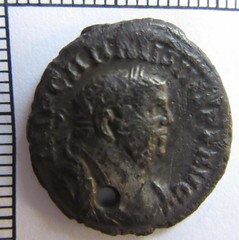
PREV ARTICLE
NEXT ARTICLE
FULL ISSUE
PREV FULL ISSUE
DETECTORIST BEATS OUT BRITISH MUSEUM
This article from the Salisbury Journal describes how a metal detectorist was able to keep a coin he'd found despite Britain's Treasure laws.
-Editor
The silver Denarius coin was found in September 2015 on farmland at Aldham, near Hadleigh, by Jonathan Brooks. Last year an inquest had to be adjourned after Mr Brooks said he wanted to challenge any treasure ruling, which would have seen the coin become available to the British Museum. The British Museum had initially said that, while single coins were not usually regarded as treasure, the one found by Mr Brooks had a hole drilled through it and may not have then been used as currency. But Mr Brooks said that while other finds he had made in the past had been declared as treasure, he believed this “very rare” coin was not and should be returned him. He told the inquest: “The hole could have been drilled by me, by a Victorian person or others over hundreds of years.” On Monday, Mr Brooks was at Suffolk Coroner’s Court in Ipswich to hear assistant Suffolk Coroner Nigel Parsley rule that, because of doubts about what the coin would have been used for, it could not be declared as treasure.
Britain's Treasure laws are pretty specific, limiting their application to hoards rather than individual pieces. This is the first found coin I can recall with a hole in it (and a pretty big one at that). Was it once used for jewellery? If declared Treasure, Museums have the opportunity to purchase the coins at fair market value, with the proceeds split evenly by the finder and landowner. This ruling allows the finder to offer the coin for sale at a price of his own choosing. -Editor
To read the complete article, see:
The umbrella term for the laws and regulations surrounding treasure finds is the Portable Antiquities Scheme.
-Editor
The scheme's aims are:
For more information on the Portable Antiquities Scheme, see:
The Numismatic Bibliomania Society is a non-profit organization promoting numismatic literature. See our web site at coinbooks.org. To submit items for publication in The E-Sylum, write to the Editor at this address: whomren@gmail.com To subscribe go to: https://my.binhost.com/lists/listinfo/esylum All Rights Reserved. NBS Home Page Contact the NBS webmaster 
|
